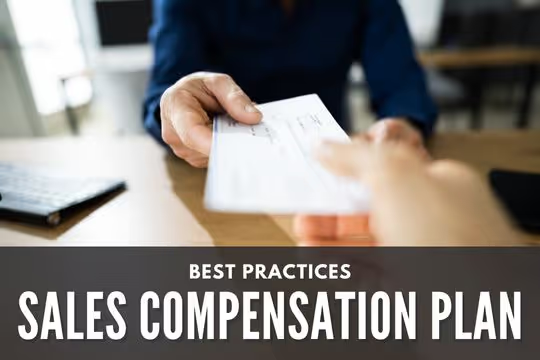

Ideally, your sales compensation plan should motivate reps to achieve their goals. When sales reps know they'll earn commission through hitting quota goals, you're more likely to have a high-performing sales team on your hands.
Unfortunately, this isn't as straightforward as it sounds on paper. Your sales reps aren't machines, so you'll need to consider the human element. There are other variables to consider as well. In our guide to sales compensation plan best practices, we'll go over the most pertinent ones.

When you put a sales compensation plan in place, you're determining how much sales reps will earn based on their individual performance. In so doing, you'll lay down expectations that should drive the employees to succeed.
Here are just a few of the benefits you can expect to enjoy by employing these sales compensation plan best practices:
This plan will affect numerous individuals across many departments. As such, you should assemble a team so that the plan will benefit the entire organization. We would recommend beginning with the following departments.
This is the most obvious answer, as the sales reps are the ones who stand to benefit most from the plan. In the end, though, the entire company will be able to reap the rewards of their hard work.
Encourage the sales representatives to keep an eye on market expectations to make more informed decisions. The senior reps should focus on recruiting and retaining talent so that you can add more top performers to your team.
The finance department members need to be aware of the plan, as the cost will affect the company's bottom line.
How much will the plan cost, and are the results worth it? These are questions that will need to be readdressed on an ongoing basis. Above all, you want the plan to align with the rest of the company's corporate goals.

The HR department supports employees, but when it comes to sales compensation plan best practices, they have another role to fill.
You'll need the support of the HR team to provide basic information about the employees and their roles within the organization. They should also be able to help out with issues such as market pay data and benchmarking.
Looking beyond the organization, you may want to enlist the aid of a consulting firm or other strategic services.
After your sales experts have had a chance to evaluate the plan, consider bringing in an outsider to provide their unbiased opinion. They may also be able to educate you on the most current practices, so you'll know whether you're on the right track. As outsourced services go, this is among the most valuable.
If there's no commission plan, the performing reps won't have any incentive to meet or exceed their quotas. By putting sales compensation plans into action, you can ensure that every member of your sales team will want to strive to be a top performer.
Every sales cycle allows your employees to give it their all. Your goal is to ensure that the performance level never hits a plateau but keeps going up and up. Here's how to get started.
You might be tempted to set the quota bar low at the outset to help your team members avoid discouragement. But if you set it too low, the sales reps won't be motivated to aim higher.
On the other end of the spectrum, setting the bar too high may convince the employees that they'll never be able to reach it. When this happens, they're bound to give up too quickly.
Use your company data to determine where the quota bar should be set. If it doesn't seem to be working, you can adjust it later, but it's better to start with a bang.
You might also consider different commission structures within the confines of the plan. Tiered commission structures offer varying pay rates to incentivize reps to improve their sales performance even after hitting quota.

Incentives have to be worth the effort. Otherwise, there will be no motivating factor for the sales reps to earn them. If they feel that the effort they're putting in is worth more than the reward they'll receive, they're bound to give up.
That said, your leaders will have to use their sales forecasting skills to help ensure that the incentives are reasonable. Otherwise, you might find yourself doling out high incentives even when the sales performance fails to align with company goals.
You can customize the comp plans based on the individual's specific roles. You wouldn't use the same model for the managers the sales reps report to, so similar rules apply here. Create incentives that will induce the underachievers to boost their performance while using different ones on the reps that always hit their goals.

Some companies reduce their incentives after the sales reps have exceeded their quota by a certain percentage. That won't encourage the behavior you're hoping for.
Instead, it lets the employees know there's no need to over-perform once they've reached a certain level. As a result, they may begin to slack off.
This can lead to the phenomenon known as "sandbagging." This is where a sales rep holds off on deals within a certain month because they've already hit the quota for their periodic bonus. It makes more sense for them to hold the deal for the following month—at least, that's how they're bound to see it if you use a capped commission model.
Use a consistent plan allowing reps to make up for missed months if needed. That way, they'll be less likely just to throw up their hands and quit when they've lost their stride.
When you use this model, 50 percent of the rep's on-target earnings (OTE) is made up of a base salary, while the other 50 percent is based on performance.
Offer a percentage on any sales the rep closes and a bonus amount for hitting or exceeding their target earnings. You can also consider adding quarterly bonuses to the mix. This is a simple model that works consistently to reward top performers.

When implementing or making changes to your sales compensation plan, it's in your best interest to share the details with the team as soon as possible.
If you wait too long to share the details, your team will feel alienated and undervalued. You can build their trust by leading training sessions to discuss the plans and let them know exactly why you've chosen the model you have. This will also provide the team members with a golden opportunity to ask any questions they might have.
Similarly, it's important to be transparent about how commissions are calculated and paid and the payment dates. For example, the sales rep will want to know if the commission is paid upon the first customer payment versus the contract signing.
You must keep talented and engaged team members on board to run an effective sales department, and these sales compensation plan practices are an excellent place to begin.
If your business needs e marketing online assistance, schedule a 15-minute discovery call with a Small Business Growth Advisor, and subscribe to our newsletter today!
It clarifies expectations, motivates reps through clear commission pathways, supports budgeting, and unites sales, finance, and HR around shared goals, ultimately driving higher performance.
Analyze historic data, market conditions, and team capacity. Set a target that stretches reps without discouraging them. Monitor results and adjust if quotas prove consistently too easy or impossible.
No. Capping commissions signals that over-performance is pointless, encouraging sandbagging and lost revenue. Keeping the cap off lets high achievers keep pushing, benefitting both the rep and the company.
Under the 50/50 model, half of a rep's on-target earnings is fixed salary and half is variable pay tied to results, often with extra bonuses for exceeding quota. Simple, motivating, and predictable.
Share plan details early, explain how commissions are calculated, and specify payment timing. Training sessions and Q&A build trust and give reps confidence that payouts will match their effort.